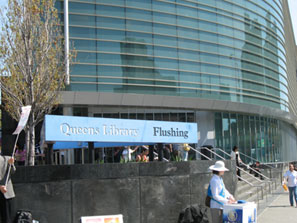
Queens Library president and CEO Thomas Galante is having a bad year. His once-solid reputation has taken a hit from allegations of mismanagement and corruption at the taxpayer-supported library system. The charges include excessive compensation, waste, and failure to disclose outside sources of income. The FBI and the New York City Department of Investigation (DOI) have launched probes into the most serious accusations against Galante: that he inappropriately gave lucrative contracts to associates. But in the eyes of the library union and labor-backed politicians, Galante’s greatest offense seems to have been his implementation of a modest privatization plan to save money on custodial services.
Galante was hired as Queens Library’s business manager in 1987 and appointed head of the 62-branch system in 2005. Compared with the heads of New York’s other public library systems, Galante cuts a blue-collar figure: New York Public Library’s Anthony Marx is a former Amherst College president; Brooklyn Public Library’s Linda Johnson was once engaged to billionaire Leonard Lauder. But as Daily News columnist Juan Gonzalez reported in January, Galante’s compensation is anything but blue collar. Last year, he made about $400,000, overseeing a $125 million budget and about 1,600 employees. NYPD commissioner Ray Kelly, by comparison, was paid $205,180 to manage a $4.9 billion budget and 50,000 employees.
Finally, a reason to check your email.
Sign up for our free newsletter today.
Though difficult to justify, Galante’s compensation can be explained. New York’s library systems are independent nonprofits, not city agencies. The Queens Library depends on government for nearly all its funding, but its board determines executive compensation relative to the pay for leaders of comparable nonprofit educational and cultural institutions. The peer organizations that set the benchmark for Galante’s pay have annual revenues of $50 million to $150 million and include Brooklyn Law School, the Juilliard School, and Wagner College.
But Galante’s salary wasn’t the only thing that drew Gonzalez’s attention. In addition to his work at Queens Library, Galante has been moonlighting as a “business consultant” for the Elmont Union Free School District in Nassau County, making as much as $200,000 annually. Galante has insisted that this side work doesn’t conflict with his duties as president and CEO. But that strains credulity, given that Gonzalez’s recent analysis of payroll documents found that, during eight separate weeks over the past seven months, Galante had put in over 30 hours at Elmont. And the Queens Library reportedly awarded $40 million in construction contracts to builder Frank Marino, who has ties to the same school district for which Galante consults.
The Daily News editorial board and Queens state senator Tony Avella have called for Galante to resign or be relieved of his duties by the library board. City comptroller Scott Stringer has announced plans for an audit of all library systems. The FBI and the DOI have subpoenaed Galante and Marino, presumably to examine whether Galante and Marino had an illegal quid pro quo agreement. Queens borough president Melinda Katz called on the library system’s board to restructure its compensation policies and suggested that Mayor Bill de Blasio assume complete responsibility over the library’s capital spending to ensure “better accountability and transparency.”
And yet, as a February New York City Council hearing revealed, the campaign against Galante stems less from concern over the mismanagement charges, serious as they are, than from union anger over privatization. City cuts have left the Queens Library operating budget $16 million—or 17 percent—below its 2008 level. Galante recently hired contract cleaners to supplement the custodial work done by the system’s unionized library employees. This arrangement, negotiated with the union, involved only seven full-time equivalent positions. Prior to the hearing, Galante said, “I was paying $35 an hour to janitors to mop floors, and now we’re paying $15.” Faced with a trade-off between paying union wages across the board and maintaining library hours, Galante said, he chose to keep the library open, saving $500,000 a year.
None of this sat well with City Council Majority Leader Jimmy Van Bramer, who, in addition to being chair of the Committee on Cultural Affairs, Libraries and International Intergroup Relations, is also former chief of external affairs for the Queens Library and stepson of a public school custodian. After extracting an apology from Galante for the “$35 an hour” remark (for its purported insensitivity), Van Bramer and his colleagues urged the library chief to replace the contract cleaners with more expensive union labor. They refused to acknowledge the tension that can exist between serving patrons and being generous toward employees. Queens Council Member Elizabeth Crowley, one of Galante’s most aggressive critics, argued that the Queens Library and the other two city systems should have labor representation on their boards. Council Member Rory Lancman, also from Queens, suggested giving the council direct board appointments. Public Advocate Letitia James, currently a nonvoting ex-officio member of the Queens Library board, declared that the recent revelations justified giving her voting authority. The library union agrees.
Whatever credit the city council can claim for raising public awareness of Galante’s failings is outweighed by its excessive outrage over his use of contract labor. An appropriate reform plan for the Queens Library would include both scaled back executive compensation and a more tolerant attitude toward privatization. At Katz’s urging, the board has already eliminated the evergreen clause in Galante’s contract and is reassessing its executive compensation policies. Katz is also looking into state legislation that would require greater financial disclosure from library officials.
Until last year, the Queens Library was known as “the good one” among New York’s three public library systems. Under Galante, it received the 2009 Library of the Year award from Gale/Library Journal. While the library itself may be in good health, though, its president’s troubles are just beginning.
